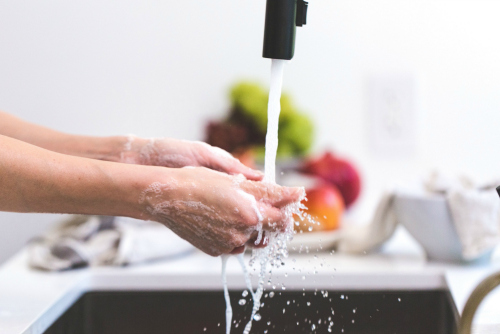If you haven’t seen them already, keep your eyes peeled: Hand-washing signage will soon be in every public restroom on Wayne State University’s campus, thanks to a comprehensive health promotion campaign organized by the Campus Health Center (CHC) and the Office of Environmental Health and Safety (OEHS).
“Our main goal with this campaign is to provide education about the importance of hand-washing in keeping the campus community healthy and focused on academic success,” explained Ann Rayford, chief nursing officer at the CHC. “This campaign is also a good reminder for all Wayne State community members that proper hand-washing is an important method to prevent the transmission of influenza and hepatitis A.”
 Michigan is in the midst of a hepatitis A outbreak and is starting to see the peak of flu season. As of Jan. 12, 2018, there are no reported cases of hepatitis A on the WSU campus. “We’d like to keep it that way,” said Rayford, who notes that both influenza and hepatitis A vaccines are available at the Campus Health Center.
Michigan is in the midst of a hepatitis A outbreak and is starting to see the peak of flu season. As of Jan. 12, 2018, there are no reported cases of hepatitis A on the WSU campus. “We’d like to keep it that way,” said Rayford, who notes that both influenza and hepatitis A vaccines are available at the Campus Health Center.
In addition to vaccination, Rayford recommends hand-washing to help prevent illness. According to the Centers for Disease Control and Prevention (CDC), proper hand-washing is the best way to remove germs, avoid getting sick and prevent the spread of germs to others. With five simple steps (wet, lather, scrub, rinse, dry), it is an effective way to reduce the spread of diarrhea and respiratory illness.
In addition to the signage in all the restrooms, the CHC and OEHS will be hosting a hand-washing event in the south entrance of the Student Center Building on Tuesday, Jan. 30, from 10 a.m. to 2 pm. There will be hand-washing demonstrations, LED germ lights, giveaways and a Starbucks gift card will be awarded to one lucky person at the kickoff event.
“We aim to engage and educate the WSU community about the importance of hand-washing to their health,” said Pamela Herzog, food safety officer at OEHS. “The No. 1 way to stop the spread of illness-causing bacteria is through effective hand-washing. The CDC recommends scrubbing for at least 20 seconds.”
College of Nursing community health students will be assisting with the event and providing health education materials. “During a placement at the Campus Health Center, our nursing students get many population- based experiences in community/public health nursing,” said Joan Bickes, assistant professor, who teaches Nursing 4120, Community Focused Nursing Practice. “Our B.S.N. students learn about launching a health promotion campaign on campus, and gain experience and knowledge that they can apply in their career.”
You can help yourself and others stay healthy by washing your hands often, especially during key times when germs are likely to get on your hands and easily spread. Examples from the CDC include:
- Before, during, and after preparing food
- Before eating food
- Before and after caring for someone who is sick
- Before and after treating a cut or wound
- After using the toilet
- After blowing your nose, coughing or sneezing
- After changing diapers or cleaning up a child who has used the toilet
- After touching an animal, animal feed or animal waste
- After touching garbage
While alcohol-based hand sanitizer can be used if soap and water are not available, sanitizer does not replace proper hand-washing. If sanitizer must be used, choose an alcohol-based hand sanitizer that contains at least 60 percent alcohol.
For more information on hand-washing, please contact the Campus Health Center or the Office of Environmental Health and Safety. You can also visit the CDC’s hand-washing website, write CDC-INFO or call 1-800-CDC-INFO for answers to specific questions.
To request hand-washing signage please call the CHC at 313-577-5041 or the OEHS at 313-577-1373.
